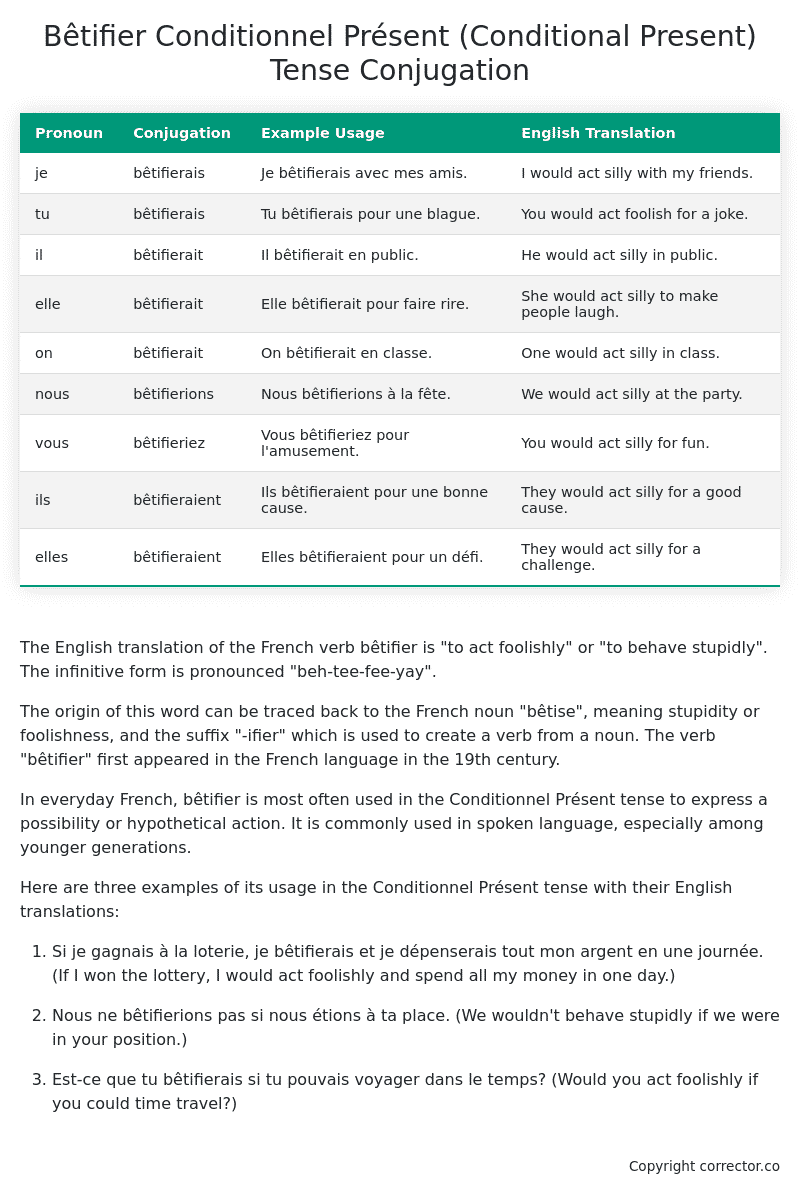Conditionnel Présent (Conditional Present) Tense Conjugation of the French Verb bêtifier
Introduction to the verb bêtifier
The English translation of the French verb bêtifier is “to act foolishly” or “to behave stupidly”. The infinitive form is pronounced “beh-tee-fee-yay”.
The origin of this word can be traced back to the French noun “bêtise”, meaning stupidity or foolishness, and the suffix “-ifier” which is used to create a verb from a noun. The verb “bêtifier” first appeared in the French language in the 19th century.
In everyday French, bêtifier is most often used in the Conditionnel Présent tense to express a possibility or hypothetical action. It is commonly used in spoken language, especially among younger generations.
Here are three examples of its usage in the Conditionnel Présent tense with their English translations:
-
Si je gagnais à la loterie, je bêtifierais et je dépenserais tout mon argent en une journée. (If I won the lottery, I would act foolishly and spend all my money in one day.)
-
Nous ne bêtifierions pas si nous étions à ta place. (We wouldn’t behave stupidly if we were in your position.)
-
Est-ce que tu bêtifierais si tu pouvais voyager dans le temps? (Would you act foolishly if you could time travel?)
Table of the Conditionnel Présent (Conditional Present) Tense Conjugation of bêtifier
| Pronoun | Conjugation | Example Usage | English Translation |
|---|---|---|---|
| je | bêtifierais | Je bêtifierais avec mes amis. | I would act silly with my friends. |
| tu | bêtifierais | Tu bêtifierais pour une blague. | You would act foolish for a joke. |
| il | bêtifierait | Il bêtifierait en public. | He would act silly in public. |
| elle | bêtifierait | Elle bêtifierait pour faire rire. | She would act silly to make people laugh. |
| on | bêtifierait | On bêtifierait en classe. | One would act silly in class. |
| nous | bêtifierions | Nous bêtifierions à la fête. | We would act silly at the party. |
| vous | bêtifieriez | Vous bêtifieriez pour l’amusement. | You would act silly for fun. |
| ils | bêtifieraient | Ils bêtifieraient pour une bonne cause. | They would act silly for a good cause. |
| elles | bêtifieraient | Elles bêtifieraient pour un défi. | They would act silly for a challenge. |
Other Conjugations for Bêtifier.
Le Present (Present Tense) Conjugation of the French Verb bêtifier
Imparfait (Imperfect) Tense Conjugation of the French Verb bêtifier
Passé Simple (Simple Past) Tense Conjugation of the French Verb bêtifier
Passé Composé (Present Perfect) Tense Conjugation of the French Verb bêtifier
Futur Simple (Simple Future) Tense Conjugation of the French Verb bêtifier
Futur Proche (Near Future) Tense Conjugation of the French Verb bêtifier
Plus-que-parfait (Pluperfect) Tense Conjugation of the French Verb bêtifier
Passé Antérieur (Past Anterior) Tense Conjugation of the French Verb bêtifier
Futur Antérieur (Future Anterior) Tense Conjugation of the French Verb bêtifier
Subjonctif Présent (Subjunctive Present) Tense Conjugation of the French Verb bêtifier
Subjonctif Passé (Subjunctive Past) Tense Conjugation of the French Verb bêtifier
Subjonctif Imparfait (Subjunctive Imperfect) Tense Conjugation of the French Verb bêtifier
Subjonctif Plus-que-parfait (Subjunctive Pluperfect) Tense Conjugation of the French Verb bêtifier
Conditionnel Présent (Conditional Present) Tense Conjugation of the French Verb bêtifier (this article)
Conditionnel Passé (Conditional Past) Tense Conjugation of the French Verb bêtifier
L’impératif Présent (Imperative Present) Tense Conjugation of the French Verb bêtifier
L’infinitif Présent (Infinitive Present) Tense Conjugation of the French Verb bêtifier
Struggling with French verbs or the language in general? Why not use our free French Grammar Checker – no registration required!
Get a FREE Download Study Sheet of this Conjugation 🔥
Simply right click the image below, click “save image” and get your free reference for the bêtifier Conditionnel Présent tense conjugation!

Bêtifier – About the French Conditionnel Présent (Conditional Present) Tense
Formation
Common Everyday Usage Patterns
Expressing Polite Requests
Expressing Hypothetical Situations
Expressing Doubt or Uncertainty
Interactions with Other Tenses
Present Tense
Past Tense
Future Tense
Conditional Perfect
Summary
Want More?
I hope you enjoyed this article on the verb bêtifier. Still in a learning mood? Check out another TOTALLY random French verb conjugation!


